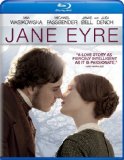| Reviews & Columns |
|
Reviews DVD TV on DVD Blu-ray 4K UHD International DVDs In Theaters Reviews by Studio Video Games Features Collector Series DVDs Easter Egg Database Interviews DVD Talk Radio Feature Articles Columns Anime Talk DVD Savant Horror DVDs The M.O.D. Squad Art House HD Talk Silent DVD
|
DVD Talk Forum |
|
|
| Resources |
|
DVD Price Search Customer Service #'s RCE Info Links |
|
Columns
|
|
|
Jane Eyre (2011)
Universal // PG-13 // August 16, 2011
List Price: $34.98 [Buy now and save at Amazon]
The Film:
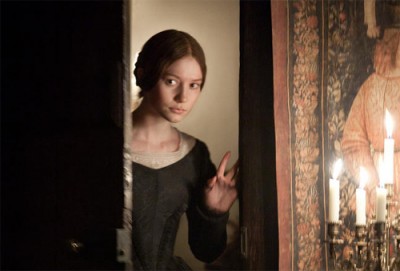 Mia Wasikowska captivates the very moment she arrives in Cary Fukunaga's adaptation of Jane Eyre, Charlotte Brontë's long-celebrated character study folded within a tale of gothic romance. Draped in dark teal mid-1800s garb as tears stream down her embattled face, lamenting under a dark-orange sky and, eventually, torrential rainfall, it's clear we're witnessing a far cry from the wooden Alice from Burton's cockamamie adventure into Wonderland. There's a wealth of complexity that propels the character to this point, as we'll soon discover (and as long-standing readers of the novel know), which focuses on a woman granted intellect and determination over beauty and poise. Fukunaga's vision grasps Jane's involvedness as a complex sheltered female character while cautiously smoldering where other adaptations might overextend, punctuated by Wasikowska's meekly spirited presence.
Mia Wasikowska captivates the very moment she arrives in Cary Fukunaga's adaptation of Jane Eyre, Charlotte Brontë's long-celebrated character study folded within a tale of gothic romance. Draped in dark teal mid-1800s garb as tears stream down her embattled face, lamenting under a dark-orange sky and, eventually, torrential rainfall, it's clear we're witnessing a far cry from the wooden Alice from Burton's cockamamie adventure into Wonderland. There's a wealth of complexity that propels the character to this point, as we'll soon discover (and as long-standing readers of the novel know), which focuses on a woman granted intellect and determination over beauty and poise. Fukunaga's vision grasps Jane's involvedness as a complex sheltered female character while cautiously smoldering where other adaptations might overextend, punctuated by Wasikowska's meekly spirited presence.
Penned by Moira Buffini and considered one of the better unproduced British screenplays a few years prior to filming, the tightly-adapted and often reverent script operates on flashbacks -- a smart and effective way of condensing the book's segments -- through Jane's schooling, her time as educator and governess of Thornfield Hall, and her life afterwards as a meager cottage-girl schoolteacher. She endures physical and mental turmoil in her younger years as an orphaned cast-off, yet she expounds on that and becomes a sharp, strong woman who finds a place at wealthy governor Mr. Rochester's home as the educator of his young ward, Adele, likely his legitimate daughter. While the core of Jane Eyre pivots on their blossoming relationship, pairing Mr. Rochester's brusque manner against her secluded yet impassioned carriage, it also focuses on how she defends her integrity and wrestles with the demons of her past. And others'.
Brontë's novel has seen countless adaptations since its 1847 publication, from the snappy '40s Welles-Fontaine film to a handful of fine '70s-'80s BBC miniseries, so achieving a fresh "classic" perspective proves to be a tricky endeavor. Fukunaga, whose previous film Sin Nombre was one of 2009's finest, achieves originality by enhancing the nuance of Jane's individualism and the gothic tone that submerges the story' mildly sinister underbelly, crafting a somber yet sprightly depiction of a Victorian woman whose past troubles serve as internal tools and shackles. There's gravity behind how Jane holsters -- even masks -- her sheltered fervor and discomfiture, which turns a contemporary viewpoint towards her strong personality; in that, Jane Eyre builds momentum with fraught emotional suspense as well, from the crane lashes and shunning in her harsh school environment to the sharp-tongued subordination in the company of her intentionally curt lord.
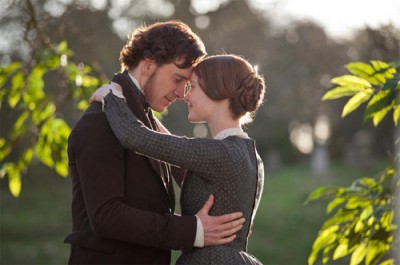 With Sin Nombre's Adriano Goldman behind the lens, Fukunaga dresses the 19th Century period with lush but sensible detail, a transfixing atmosphere where the clothing and locations operate at the same volume as the film's frequently eerie temper. This isn't meant to be a showcase of ritzy frocks and sumptuous photography within the isolation of Thornfield Hall and elsewhere in the dampened moors of England, even if the occasional aristocratic garment and expansive vista (or fork in the road) does catch the eye. The windswept nature of Jane Eyre's artistic fabric instead emphasizes quaintness and claustrophobic gloom, where flickering candles and cool natural light elevate the stirring mood within the governess' plain frame, perceptive and restrained in terms of the broad, brooding romance that eventually arises. Alongside Dario Marianelli's haunting score, the film's outer beauty resides in its projection of the story's inner turmoil, and it vividly does so.
With Sin Nombre's Adriano Goldman behind the lens, Fukunaga dresses the 19th Century period with lush but sensible detail, a transfixing atmosphere where the clothing and locations operate at the same volume as the film's frequently eerie temper. This isn't meant to be a showcase of ritzy frocks and sumptuous photography within the isolation of Thornfield Hall and elsewhere in the dampened moors of England, even if the occasional aristocratic garment and expansive vista (or fork in the road) does catch the eye. The windswept nature of Jane Eyre's artistic fabric instead emphasizes quaintness and claustrophobic gloom, where flickering candles and cool natural light elevate the stirring mood within the governess' plain frame, perceptive and restrained in terms of the broad, brooding romance that eventually arises. Alongside Dario Marianelli's haunting score, the film's outer beauty resides in its projection of the story's inner turmoil, and it vividly does so.
Buffini's script shears the judiciously-spread Jane Eyre down to its evocative foundation -- Jane's time at Thornfield Hall -- while clutching onto the elements that shape her from her youth as periphery devices, condensing the lengthy source material into a spry yet sober telling of ominous romance. Brevity does work against Fukunaga, as it's tough to fit Jane's maturation and the complex romance built between her and Mr. Rochester within a standard-length motion picture. But the unique chemistry between Mia Wasikowska and Michael Fassbender achieves a disarming rapport that accentuates their individual introspections, and the way they uncomfortably mesh into aristocratic and gender power-struggling. Wasikowska shines as the plain but alluring Jane, articulated by her tense eyes and mousy, volume-speaking composure, while Fassbender's snarling edge crafts a deft blend of cynical distress and allure.
Some could argue that Jane Eyre lacks vigor or even passion between the leads, and that's a valid argument in its own right, but Fukunaga's restraint over the melodramatic overtones also opens up the introspective corners of the prudent governess and her Byronic lord. That way, when the floodgates of their self-possessed chemistry eventually burst open on an abnormal sunny English afternoon, the austere back-and-forth that ensues properly exposes their open wounds as individuals, both Jane's yearning for liberty and moral clarity and the shadows of the skeletons in Mr. Rochester's closet. You get a sound sense of the Jane Eyre that's sprawled across her past, present, and future, a defiant woman who yearns for some semblance of impartiality, and in this moody retelling of the oft-told yarn, it's her steadfast choices and weathered, resolute demeanor that underscore Brontë's overwrought closet-opening.
The Blu-ray:
Video and Audio:
Jane Eyre's candlelit interiors and English countryside haze arrive from Universal in 1.85:1-framed 1080p AVC encode, preserving the look that director Fukunaga and cinematographer Adriano Goldman intended for the melancholy tale. The contrast naturally leans towards the gray side in accordance with the picture's aesthetic, rendering a cold and cloudy atmosphere with slate-leaning greens, blues, and browns, yet Universal's transfer tends to offer lighter black levels and balance that oversteps the filmmakers' aims. Through the obscurity, the photography's alluring elements offer their nuanced treats in an unassuming high-definition success; supple, stony flesh tones interact with the diffused lighting appropriately, the costume work -- bodices, corsets, and worn fabric -- etches out a few eye-popping moments, and the damp, dreary landscape sprawls with well-perceived depth-of-field awareness.
Dario Marianelli's score naturally becomes the dominating force within Universal's DTS HD Master Audio track, yet the overall sound design offers a slate of robust ambient elements that amplify its magnetism. While the music -- sure to be a contender come award season -- navigates the quality with mindful interspersing and fierce punctuation against the film's tone, the incorporation of harsh thudding wood elsewhere in Thornfield Hall, the rush of an aggravated bird in the haze of night, the billow of smoke from a chimney, and the echo of gunshots in the distance harness space-aware clarity that's highly rewarding. The dialogue maintains a hearty poise that's both aware of the scene's location and of the right amount of clarity, from the holstered tone in Wasikowska's delivery to Fassbender's gruffness and Judi Dench's weathered charm. It's a stellar aural treatment. English SDH, Spanish, and French optional subtitles can be paired with the English Master Audio track, while a Spanish 5.1 DTS track is also available.
Special Features:
Commentary with Cary Fukunaga:
Softspoken director Fukunaga makes it clear upfront that he's listened to quite a few commentaries in the past, and that he's after a more technically-geared, insightful, thematic track. He delivers just that, in a restrained manner; he immediately digs into the composite points in constructing the film, from the visual storytelling emphasized in Moira Buffini script, dodging modern structures in the photography, using flashbacks, the natural (and scattered usage of non-natural) lighting, digital effects, and others. He talks about shooting around Derbyshire and capturing the accents that might populate the era, casting Wasikowska age-appropriately, and plenty of discussion on other small elements -- including some more "realistic" interpretations of the novel's content, alongside more intricate references laced inside the film. He hits some quiet gaps, but Fukunaga's content always has a point and never really meanders for the entirety of the track.
Deleted Scenes (16:52, HD AVC):
Special note needs to be made about the slate of unused material available here, mostly because they refer to an alternate "director's cut" that Cary Fukunaga had in mind. An interview with Fukunaga and Wasikowska conducted early in 2011 (interview here) commented on a two-and-a-half hour alternate version that was considered, ultimately trimmed down for time-space and overall tempo; if the deleted scenes available here are an indication of what was contained in that cut, then it would've offered more nods to the novel and likely moved at a familiarly brisk pace. Scenes like the "tearing of the veil" part were, indeed, shot but left on the cutting room floor, along with other intriguing elements. If Fukunaga were to release a director's version that reintegrated these elements, I'd be completely game.
Unfortunately, the remaining three supplements sound more in-depth and sprawling than they actually are; clocking in at under eight minutes total, the three features -- A Look Inside Jane Eyre (3:42, HD AVC), To Score Jane Eyre (2:14, HD AVC), and The Mysterious Light of Jane Eyre (1:52, HD AVC) -- tackle the subjects of casting, music, and cinematography within extremely brief collages of interviews and behind-the-scenes shots.
Final Thoughts:
While the script that Moira Buffini composed for Jane Eyre takes a few daring, condensing turns, Cary Fukunaga's direction imbues the story with a degree of thematic weight, reverence, and gothic essence that closely reflects on Charlotte Brontë's literary tone. Much of the film's potency rests in the eyes and poise of young Australian actress Mia Wasikowska, who captures the young governess' plainness and quick-witted perception in the subtly captivating, dark romance, which also persists with the mild pulse of an eerie thriller inside the confines of Mr. Rochester's creaky home. Everything here gels together, though, from the stellar production design and the evocative mood to the nimble bursts of emotion where needed, coming together in one of 2011's best films. Universal's Blu-ray dishes out strong audiovisual merits, alongside a fine commentary track and essential deleted scenes. Highly Recommended.
Thomas Spurlin, Staff Reviewer -- DVDTalk Reviews | Personal Blog/Site
 Mia Wasikowska captivates the very moment she arrives in Cary Fukunaga's adaptation of Jane Eyre, Charlotte Brontë's long-celebrated character study folded within a tale of gothic romance. Draped in dark teal mid-1800s garb as tears stream down her embattled face, lamenting under a dark-orange sky and, eventually, torrential rainfall, it's clear we're witnessing a far cry from the wooden Alice from Burton's cockamamie adventure into Wonderland. There's a wealth of complexity that propels the character to this point, as we'll soon discover (and as long-standing readers of the novel know), which focuses on a woman granted intellect and determination over beauty and poise. Fukunaga's vision grasps Jane's involvedness as a complex sheltered female character while cautiously smoldering where other adaptations might overextend, punctuated by Wasikowska's meekly spirited presence.
Mia Wasikowska captivates the very moment she arrives in Cary Fukunaga's adaptation of Jane Eyre, Charlotte Brontë's long-celebrated character study folded within a tale of gothic romance. Draped in dark teal mid-1800s garb as tears stream down her embattled face, lamenting under a dark-orange sky and, eventually, torrential rainfall, it's clear we're witnessing a far cry from the wooden Alice from Burton's cockamamie adventure into Wonderland. There's a wealth of complexity that propels the character to this point, as we'll soon discover (and as long-standing readers of the novel know), which focuses on a woman granted intellect and determination over beauty and poise. Fukunaga's vision grasps Jane's involvedness as a complex sheltered female character while cautiously smoldering where other adaptations might overextend, punctuated by Wasikowska's meekly spirited presence. Penned by Moira Buffini and considered one of the better unproduced British screenplays a few years prior to filming, the tightly-adapted and often reverent script operates on flashbacks -- a smart and effective way of condensing the book's segments -- through Jane's schooling, her time as educator and governess of Thornfield Hall, and her life afterwards as a meager cottage-girl schoolteacher. She endures physical and mental turmoil in her younger years as an orphaned cast-off, yet she expounds on that and becomes a sharp, strong woman who finds a place at wealthy governor Mr. Rochester's home as the educator of his young ward, Adele, likely his legitimate daughter. While the core of Jane Eyre pivots on their blossoming relationship, pairing Mr. Rochester's brusque manner against her secluded yet impassioned carriage, it also focuses on how she defends her integrity and wrestles with the demons of her past. And others'.
Brontë's novel has seen countless adaptations since its 1847 publication, from the snappy '40s Welles-Fontaine film to a handful of fine '70s-'80s BBC miniseries, so achieving a fresh "classic" perspective proves to be a tricky endeavor. Fukunaga, whose previous film Sin Nombre was one of 2009's finest, achieves originality by enhancing the nuance of Jane's individualism and the gothic tone that submerges the story' mildly sinister underbelly, crafting a somber yet sprightly depiction of a Victorian woman whose past troubles serve as internal tools and shackles. There's gravity behind how Jane holsters -- even masks -- her sheltered fervor and discomfiture, which turns a contemporary viewpoint towards her strong personality; in that, Jane Eyre builds momentum with fraught emotional suspense as well, from the crane lashes and shunning in her harsh school environment to the sharp-tongued subordination in the company of her intentionally curt lord.
 With Sin Nombre's Adriano Goldman behind the lens, Fukunaga dresses the 19th Century period with lush but sensible detail, a transfixing atmosphere where the clothing and locations operate at the same volume as the film's frequently eerie temper. This isn't meant to be a showcase of ritzy frocks and sumptuous photography within the isolation of Thornfield Hall and elsewhere in the dampened moors of England, even if the occasional aristocratic garment and expansive vista (or fork in the road) does catch the eye. The windswept nature of Jane Eyre's artistic fabric instead emphasizes quaintness and claustrophobic gloom, where flickering candles and cool natural light elevate the stirring mood within the governess' plain frame, perceptive and restrained in terms of the broad, brooding romance that eventually arises. Alongside Dario Marianelli's haunting score, the film's outer beauty resides in its projection of the story's inner turmoil, and it vividly does so.
With Sin Nombre's Adriano Goldman behind the lens, Fukunaga dresses the 19th Century period with lush but sensible detail, a transfixing atmosphere where the clothing and locations operate at the same volume as the film's frequently eerie temper. This isn't meant to be a showcase of ritzy frocks and sumptuous photography within the isolation of Thornfield Hall and elsewhere in the dampened moors of England, even if the occasional aristocratic garment and expansive vista (or fork in the road) does catch the eye. The windswept nature of Jane Eyre's artistic fabric instead emphasizes quaintness and claustrophobic gloom, where flickering candles and cool natural light elevate the stirring mood within the governess' plain frame, perceptive and restrained in terms of the broad, brooding romance that eventually arises. Alongside Dario Marianelli's haunting score, the film's outer beauty resides in its projection of the story's inner turmoil, and it vividly does so. Buffini's script shears the judiciously-spread Jane Eyre down to its evocative foundation -- Jane's time at Thornfield Hall -- while clutching onto the elements that shape her from her youth as periphery devices, condensing the lengthy source material into a spry yet sober telling of ominous romance. Brevity does work against Fukunaga, as it's tough to fit Jane's maturation and the complex romance built between her and Mr. Rochester within a standard-length motion picture. But the unique chemistry between Mia Wasikowska and Michael Fassbender achieves a disarming rapport that accentuates their individual introspections, and the way they uncomfortably mesh into aristocratic and gender power-struggling. Wasikowska shines as the plain but alluring Jane, articulated by her tense eyes and mousy, volume-speaking composure, while Fassbender's snarling edge crafts a deft blend of cynical distress and allure.
Some could argue that Jane Eyre lacks vigor or even passion between the leads, and that's a valid argument in its own right, but Fukunaga's restraint over the melodramatic overtones also opens up the introspective corners of the prudent governess and her Byronic lord. That way, when the floodgates of their self-possessed chemistry eventually burst open on an abnormal sunny English afternoon, the austere back-and-forth that ensues properly exposes their open wounds as individuals, both Jane's yearning for liberty and moral clarity and the shadows of the skeletons in Mr. Rochester's closet. You get a sound sense of the Jane Eyre that's sprawled across her past, present, and future, a defiant woman who yearns for some semblance of impartiality, and in this moody retelling of the oft-told yarn, it's her steadfast choices and weathered, resolute demeanor that underscore Brontë's overwrought closet-opening.
The Blu-ray:
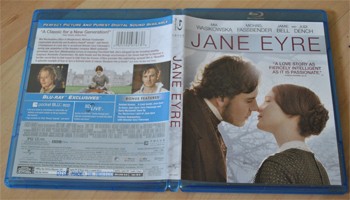 | 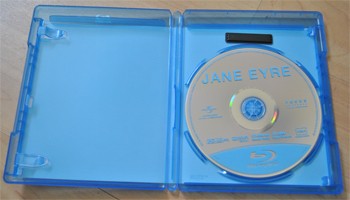 |
Video and Audio:
Jane Eyre's candlelit interiors and English countryside haze arrive from Universal in 1.85:1-framed 1080p AVC encode, preserving the look that director Fukunaga and cinematographer Adriano Goldman intended for the melancholy tale. The contrast naturally leans towards the gray side in accordance with the picture's aesthetic, rendering a cold and cloudy atmosphere with slate-leaning greens, blues, and browns, yet Universal's transfer tends to offer lighter black levels and balance that oversteps the filmmakers' aims. Through the obscurity, the photography's alluring elements offer their nuanced treats in an unassuming high-definition success; supple, stony flesh tones interact with the diffused lighting appropriately, the costume work -- bodices, corsets, and worn fabric -- etches out a few eye-popping moments, and the damp, dreary landscape sprawls with well-perceived depth-of-field awareness.
Dario Marianelli's score naturally becomes the dominating force within Universal's DTS HD Master Audio track, yet the overall sound design offers a slate of robust ambient elements that amplify its magnetism. While the music -- sure to be a contender come award season -- navigates the quality with mindful interspersing and fierce punctuation against the film's tone, the incorporation of harsh thudding wood elsewhere in Thornfield Hall, the rush of an aggravated bird in the haze of night, the billow of smoke from a chimney, and the echo of gunshots in the distance harness space-aware clarity that's highly rewarding. The dialogue maintains a hearty poise that's both aware of the scene's location and of the right amount of clarity, from the holstered tone in Wasikowska's delivery to Fassbender's gruffness and Judi Dench's weathered charm. It's a stellar aural treatment. English SDH, Spanish, and French optional subtitles can be paired with the English Master Audio track, while a Spanish 5.1 DTS track is also available.
Special Features:
Commentary with Cary Fukunaga:
Softspoken director Fukunaga makes it clear upfront that he's listened to quite a few commentaries in the past, and that he's after a more technically-geared, insightful, thematic track. He delivers just that, in a restrained manner; he immediately digs into the composite points in constructing the film, from the visual storytelling emphasized in Moira Buffini script, dodging modern structures in the photography, using flashbacks, the natural (and scattered usage of non-natural) lighting, digital effects, and others. He talks about shooting around Derbyshire and capturing the accents that might populate the era, casting Wasikowska age-appropriately, and plenty of discussion on other small elements -- including some more "realistic" interpretations of the novel's content, alongside more intricate references laced inside the film. He hits some quiet gaps, but Fukunaga's content always has a point and never really meanders for the entirety of the track.
Deleted Scenes (16:52, HD AVC):
Special note needs to be made about the slate of unused material available here, mostly because they refer to an alternate "director's cut" that Cary Fukunaga had in mind. An interview with Fukunaga and Wasikowska conducted early in 2011 (interview here) commented on a two-and-a-half hour alternate version that was considered, ultimately trimmed down for time-space and overall tempo; if the deleted scenes available here are an indication of what was contained in that cut, then it would've offered more nods to the novel and likely moved at a familiarly brisk pace. Scenes like the "tearing of the veil" part were, indeed, shot but left on the cutting room floor, along with other intriguing elements. If Fukunaga were to release a director's version that reintegrated these elements, I'd be completely game.
Unfortunately, the remaining three supplements sound more in-depth and sprawling than they actually are; clocking in at under eight minutes total, the three features -- A Look Inside Jane Eyre (3:42, HD AVC), To Score Jane Eyre (2:14, HD AVC), and The Mysterious Light of Jane Eyre (1:52, HD AVC) -- tackle the subjects of casting, music, and cinematography within extremely brief collages of interviews and behind-the-scenes shots.
Final Thoughts:
While the script that Moira Buffini composed for Jane Eyre takes a few daring, condensing turns, Cary Fukunaga's direction imbues the story with a degree of thematic weight, reverence, and gothic essence that closely reflects on Charlotte Brontë's literary tone. Much of the film's potency rests in the eyes and poise of young Australian actress Mia Wasikowska, who captures the young governess' plainness and quick-witted perception in the subtly captivating, dark romance, which also persists with the mild pulse of an eerie thriller inside the confines of Mr. Rochester's creaky home. Everything here gels together, though, from the stellar production design and the evocative mood to the nimble bursts of emotion where needed, coming together in one of 2011's best films. Universal's Blu-ray dishes out strong audiovisual merits, alongside a fine commentary track and essential deleted scenes. Highly Recommended.
|
| Popular Reviews |
| Sponsored Links |
|
|
| Sponsored Links |
|
|
| Release List | Reviews | Shop | Newsletter | Forum | DVD Giveaways | Blu-Ray | Advertise |
|
Copyright 2024 DVDTalk.com All Rights Reserved. Legal Info, Privacy Policy, Terms of Use,
Manage Preferences,
Your Privacy Choices | |||||||









